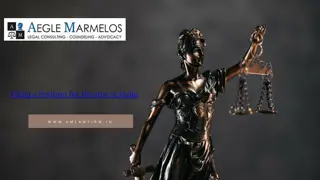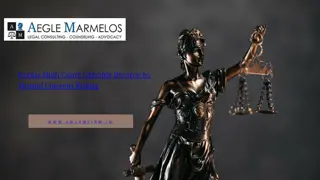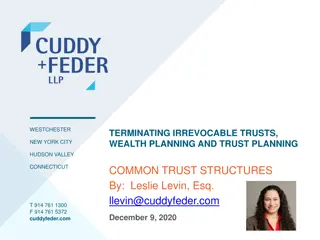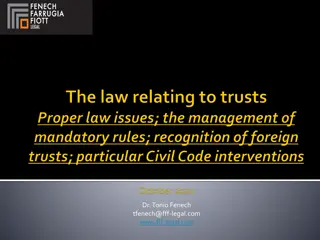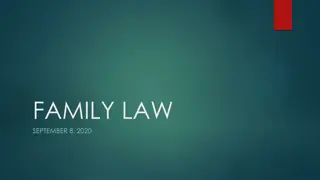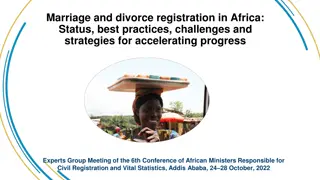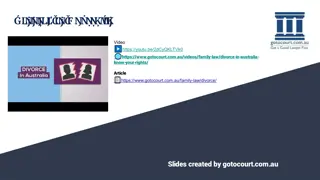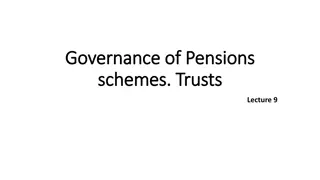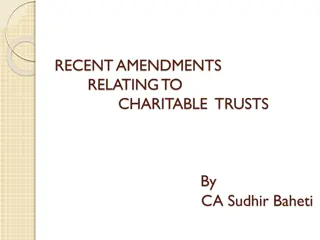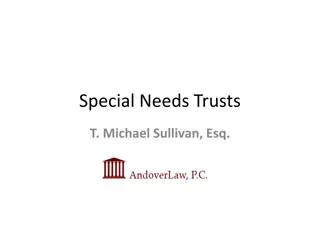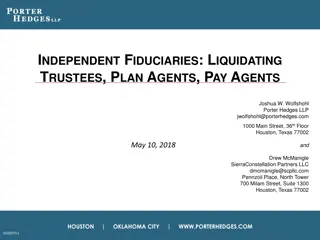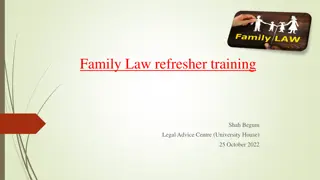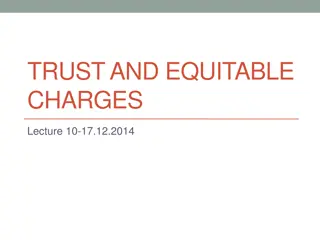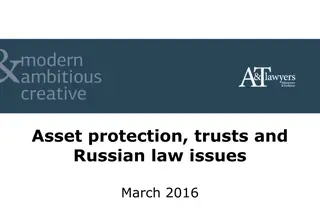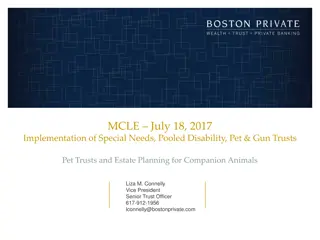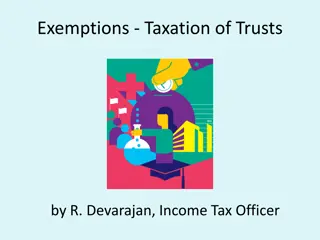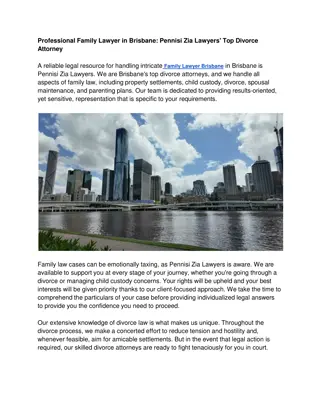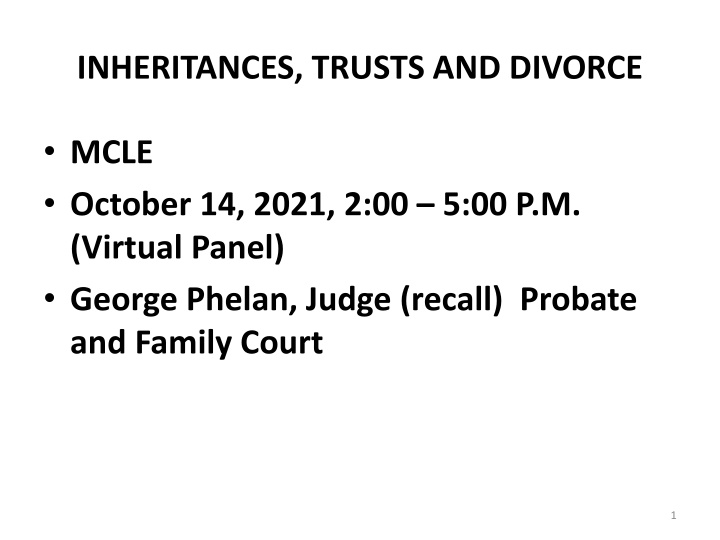
Essential Tips for Estate and Trust Counsel in Divorce Cases
Learn why estate planners need to consider trust interests in divorce cases, potential challenges in dividing assets, conflicts with estate plan provisions, and strategic considerations for protecting trust assets during beneficiary divorces. Gain insights on required document disclosures and evaluating trust interests, settlors, trustees, and beneficiaries to navigate divorce proceedings effectively.
Download Presentation

Please find below an Image/Link to download the presentation.
The content on the website is provided AS IS for your information and personal use only. It may not be sold, licensed, or shared on other websites without obtaining consent from the author. If you encounter any issues during the download, it is possible that the publisher has removed the file from their server.
You are allowed to download the files provided on this website for personal or commercial use, subject to the condition that they are used lawfully. All files are the property of their respective owners.
The content on the website is provided AS IS for your information and personal use only. It may not be sold, licensed, or shared on other websites without obtaining consent from the author.
E N D
Presentation Transcript
INHERITANCES, TRUSTS AND DIVORCE MCLE October 14, 2021, 2:00 5:00 P.M. (Virtual Panel) George Phelan, Judge (recall) Probate and Family Court 1
WHY ESTATE PLANNERS NEED TO KNOW DIVISION OF TRUST INTERESTS, EXPECTANCIES, AND HOW TO VALUE THEM Appellate divorce case law is scrutinizing trust interests, inheritances, and expectancies BECAUSE:The Divisible Marital Estate may include assets owned by someone else s trust BECAUSE:Even if not included in Divisible Marital Estate , trust interests may be considered in a beneficiary s divorce as opportunity to future-acquire income / assets (a mandatory M.G.L. ch. 208 sec. 34 factor) BECAUSE: Even assets in Irrevocable Trust with Spendthrift clause may be vulnerable to future creditors including those of your former client or the client s intended future beneficiaries BECAUSE:Recent case law erodes the notion that a trust is Irrevocable ; thus the assets of someone else s irrevocable trust may be vulnerable to division in a divorce All this must be decided before divorce counsel get to argue about valuation of trust interests in the divorce 2
ESTATE/TRUST COUNSEL MUST KNOW WHAT TRUST INTERESTS ARE VULNERABLE TO CURRENT / FUTURE DIVORCE OF BENEFICIARIES 1. Plan Defensively: do not get caught off guard by the unforeseeable divorce of a beneficiary 2. Concept of marital estate is expansive and expanding under recent case law 3. Problem: division of assets and spousal / child support court orders issued in a Trust or Will beneficiary s divorce case might conflict with or supersede estate plan document provisions 4.General Rule About Divorce Asset Inclusion: whenever / however acquired and located including the assets/prospective beneficial interests of the estate/trust counsel s clients and the clients current/future beneficiaries 5. Trust Income distributions (mandatory or discretionary) to beneficiaries may be calculated into spousal / child support orders 3
STRATEGIC THINKING FOR ESTATE/TRUST COUNSEL: What Are The Potential Marital Assets If A Trust Beneficiary Divorces Do the dispositive provisions in 3rd party settled trusts contain purported protection provisions (such as Spendthrift clause) against creditors which can be invoked if there is a beneficiary divorce; GET THE DOCUMENTS (Because Mandatory Discovery and the Probate and Family Court Form Financial Statement might not mandate disclosure): Last Will; trust; deed; Power of Attorney ; Partnership Agreements; pension and retirement plans; incentive compensation component descriptions (bonus, performance bonus, stock options, restricted stock units, etc.); life insurance policy beneficiary designations (direct payout or to a trust); LLC Operating Agreements, Pre- and Post- Nuptial Agreements Determine who are the beneficiaries and under what circumstances can the trust interest or income therefrom be stopped from distribution if the beneficiary may be embroiled in divorce WHAT ARE THE POTENTIAL TRUST INTERESTS: trust settlors; trustees who are given discretion to distribute; current / future / potential trust beneficiaries (i.e. an open or closed class); Power of Appointment; power of attorney with self-dealing clause may represent a constructive trust If you are reviewing already existing trusts, can they be modified or can the trust interests be De-Canted ASK: has the trustee ever been changed ASK: has the trustee ever exercised a power of appointment or made K-1 distributions 4
ESTATE/TRUST COUNSEL SHOULD KNOW PROBATE AND FAMILY COURT DISCOVERY RULES: What Is / Is Not Mandatory Disclosure Without Formal Discovery Requests Supp. Rules P & F CT. Rule 401 (Court form financial statement) Supp. Rules P & F CT. Rule 410 mandatory discovery exchange: federal / state income tax returns (individual and if Partnership / corporate ) for past 3 years + W-2, 1099, K-1 etc. ; 4 most recent paystubs; health insurance cost and nature; PLUS the following unless parties agree otherwise: bank account statements 3 years; investment statements / 401k / CDs, IRAs/ pensions statements 3 years; loan or mortgage applications 3 years; financial statements / profit and loss statements 3 years; *no mention of trust instruments* Supp. Rules P & F CT. Rule 411 Automatic Restraining Order : applies to divorce plaintiff when files divorce / separate support; applies to divorce defendant when served with complaint What is Restrained : do not sell, transfer, encumber, conceal, assign, remove or in any way dispose of any property, real or personal EXCEPT FOR reasonable living expenses, business expenses, ordinary course of investing, attorney fees ; beneficiaries of life insurance, pension, retirement; insurance coverages (life, health, automobile, disability); do not incur any more debts that bind the other party s credit (home equity, credit cards)* no mention of prohibition of divorce party requesting a trustee to decant * What they DO NOT COMPEL: These Mandatory Rules do not compel disclosure of important documents having dispositive provisions such as trust instruments which might reveal other potential marital assets or expectancies 5
INFORMAL DISCOVERY VIA VAUGHAN AFFIDAVIT OF THE ASSETS OWNED BY 3RD PARTIES Samuel Vaughan and another v. Elizabeth Vaughan, SJC ( 25 Nov 1991), a Memorandum and Order from an M.G.L. 211 sec. 3 petition to Single Justice on the issue of opportunity for future acquisition of capital assets and income under M.G.L. 208 sec. 34 Dad Samuel s son and Elizabeth were divorcing and Dad Samuel objects to disclosing his assets except for assets in which son had vested interests (QUESTION: Who gets to decide what assets are vested?) Balancing Test: privacy interests v. need to assess what is in divisible marital estate; or even if not to assess, what to do with divisible assets PERMITS DISCLOSURE of approximate net worth; general estate plan and when last amended OPTION: Do Formal Discovery Instead ? Moral v. Legal v. Malpractice considerations especially when elderly third parties 6
Defining and Dividing the Divorce Estate all property to which a party holds title, however acquired ; Pfannenstiehl v. Pfannenstiehl, 475 Mass. 105 (2016) Not limited to assets acquired during marriage: may include assets from pre-marital economic partnership time period; Connor v. Benedict, 481 Mass. 567 (2018) ; may include pension, retirement and like assets acquired before marriage; Moriarty v. Stone, 41 Mass. App. Ct. 151 (1996) Generally does not include assets acquired after divorce; Davidson v. Davidson, 19 Mass. App. Ct. 364 (1985) Court may proportionately divide one asset differently from another (especially when there are liquidity issues, vested interests where future enjoyment is postponed) 7
M.G.L. 208-34 DIVISION OF ASSETS FACTORS MANDATORY FACTORS: The length of the marriage Conduct of the parties during the marriage Age, health, station, occupation Amount and sources of income Vocational skills and employability Estate, liabilities and needs Opportunity for future acquisition of capital assets and income Amount and duration of alimony, if any awarded DISCRETIONARY FACTORS: contribution of each party in the acquisition, preservation or appreciation in value of their respective estates Contribution of each as a homemaker to the family unit ON APPEAL: did trial judge consider all the relevant factors; Bernier v. Bernier, 449 Mass. 774 (2007) did the trial judge consider any irrelevant factors ; Baccanti v. Morton, 434 Mass. 787 (2001) 8
Opportunity to Acquire Assets and Income in the Future and Asset Division: Divisible Asset v. Mere Expectancy IS a Mandatory M.G.L. ch. 208 sec. 34 factor for trial judge in considering Divorce division of assets There is no bright line rule; Is fact specific for each divorce MEASURE: As long as all relevant MGL sec. 208 sec. 34 factors and weight were considered, and court s conclusions flow rationally from its findings; Williams v. Massa, 431 Mass. 619 (2000) unequal but equitable division of marital assets based on opportunity factor ; Ketterle v. Ketterle, 61 Mass. App. Ct. 758 (2004): non-divisible trusts weighed in light of opportunity factor; D.L. v G.L., 61 Mass. App. Ct. 488 (2004): Krintzman v. Honig, 2010 Mass. App. (unpublished): if and when received marital division of future trust asset distributions within trustee discretion reversed. Issue of Assets Belonging to Parents of Divorcing Parties See MUPC 2-804: asset designations revoked by divorce 9
Cases: Potential Assets For Marital Division ISSUE: is it a fixed and enforceable property right ? (vested v. contingent) Even if not, still can consider a right-to-income interest for purpose of calculating divorce alimony as an opportunity for future acquisition of capital assets and income or child support D.L. v G.L., 61 Mass. App. Ct. 488 (2004): interest in trust assets too remote/ speculative thus not part of marital estate Lauricella v. Lauricella, 409 Mass. 211 (1991): attributes of a particular trust are more important than traditional property law; even intangible property interests (not in complete possession or control) may be a marital asset unless it is mere speculative expectancy Williams v. Massa, 431 Mass. 619 (2000); even if mere speculative expectancy, can still be considered under future acquisition of capital assets and income under M.G.L. 208-34; court may consider source of assets, each spouse s degree of oversignt of the inherited asset, whether asset was woven into the marriage fabric or kept separate by the inheriting spouse Child v. Child, 58 Mass. App. Ct. 76 (2003): trustee requirement to distribute is a beneficiary s present enforceable right Comins v. Comins, 33 Mass. App. Ct. 28 (1992): reliance on inheritance as a future economic failsafe caused the spouses to live beyond their means 10
Valuation and Asset Terminology ISSUE: Is Trust Interest Vested (that is, current and enforceable) ISSUE: Is Trust Interest only contingent and not yet vested (this means maybe , depending on the happening of an event in the future) ISSUE: Is Trust Interest vested + not contingent but not yet possessory (eg., remainder interest in real estate is a presently vested but not yet possessory interest until the life estate is gone) The type of trust interest and when it becomes unfettered affects its valuation due to the time it takes to perfect the interest free of contingencies (example: value of a divorcing beneficiary who holds a remainder interest in real estate where the life estate holder is 65 years old v. 95 years old 11
Marital Asset Valuation Uncertainty Does Not Exclude Trust Interest from Being A Factor in the Divorce Uncertainty of value does not automatically preclude trust assets from consideration in divorce (even though may not be included as part of divisible marital estate); may still be considered an opportunity to acquire future assets and income when the Court decides what to do with the marital assets that are divisible in divorce Concepts: Fair Market Value (especially of real estate); business valuation experts ; see Fechtor v. Fechtor 26 Mass. App. Ct. 859 (1989); INNUMERABLE VARIABLES: single family home, vacation home, commercial property, restaurants, Medical Practices with Partners, LLC with other Members, one-of-a-kind assets like a Chimney Sweep business, discounts because minority shareholders; trusts with open beneficiary class and assets which fluctuate in value; will the business be retained by a divorcing party or sold; personal v. business name goodwill if divorcing owner is/is not staying in the business; business assets and liabilities; quality of workforce How to treat asset value increase during long time period between separation and divorce; Savides v. Savides, 400 Mass. 250 (1987) Self-Valuation of present Business value is acceptable if reliable degree of business acumen / experience and in the absence of expert opinion otherwise; Dilanian v. Dilanian, 94 Mass. App. Ct. 505 92018) Expert Testimony: Court may credit all, some, or none; Vedensky v. Vedensky, 86 Mass. App. Ct. 768 (2014) REMEMBER: Divorce asset divisions are not subject to future modification unless fraud was involved (see slide on Foisie case) 12
What Date of Valuation Is Used to Divide the Marital Estate Several Possibilities Most recent financial statements Date of trial (beginning or end) typically unless circumstances warrant differently such as market forces; Moriarty v. Stone, 41 Mass. App. Ct. 151 (1996) Date of separation (but consider how long between separation and trial date); Savides v. Savides, 400 Mass. 250 (1987) (10 years passed wherein husband made exclusive and significant contributions) Date of first temporary orders Accounting for Market gains / losses from separation to date of divorce Trial judge has discretion (until appellate courts take it away ) 13
Inheritances How much in relation to the overall marital estate How far into the marriage did it come in ? The longer ago, the more the asset is woven into the fabric of the marriage Even if before the marriage, spouse may receive appreciation in value during marital coverture period; Ravasizadeh v. Niakosari, 94 Mass. App. Ct. 123 (2018) What is it: real estate, money, assets which appreciated / declined such as stock If inheritance is money and it came in during the marriage, how was it used and is any left Is there evidence that the marital lifestyle was lived frugally with a view to preserving the inheritance as a retirement fund If real estate, is it vested and presently possessory (example: fee simple interest) or must the divorcing party wait to enjoy it (remainder interest); are there other inheritors of the same asset (example: siblings) which affect inclusion in the divorce estate or complicate valuation of the asset If real estate but not yet inherited (a future expectancy ), did either party put in sweat equity or fund improvements or forego employment to caretake the property Even if it is a future inheritance and thus not part of divisible marital estate, does it warrant disparate division of assets in the divorce because other party has greater opportunity to acquire future income / assets post-divorce; Davidson v. Davidson, 19 Mass. App. Ct. 364 (1985) Party s negligent mistake of fact of value of his own inheritance; Dilanian v. Dilanian, 94 Mass. App. Ct. 505 (2018) 14
MASSACHUSETTS UNIFORM TRUST CODE ( MUTC ) M.G.L. ch 203E effective July 8, 2012 Sec. 102: Applies to express trusts, charitable or non-charitable, which are of a donative nature Sec. 105: Default and Mandatory Rules: the terms of a trust shall prevail over any provisions of Ch. 203E except: sec. (3) requirement that trust cannot be contrary to public policy; and sec. (5) the effect of a spendthrift clause in a trust and the rights of creditors as described in Sec. 5 15
WHAT STATES LAW GOVERNS INTERPRETATION / ADMINISTRATION OF THE TRUST? Unless Trust language specifies that the laws of another State apply, Massachusetts law will apply to how the Trust gets administered and construed But how trust interests are valued in divorce is determined by Massachusetts case law MUTC M.G.L. ch. 203E sec. 105 ( Trust Default and Mandatory Rules): Except as otherwise provided in the terms of the trust, this chapter shall govern the duties and powers of a trustee, relations among trustees and the rights and interests of a beneficiary. The terms of a trust shall prevail over any provision of this chapter except: (b)(5): the effect of a spendthrift provision and the rights of certain creditors and assignees to reach a trust, as provided in article 5 . 16
Trust Jurisdiction And Venue Issues Sec. 108: Principal Place of Trust Administration: Terms of trust designating which State s law controls the trust administration shall be valid if a trustee s principal place of business is located in the designated State or the trustee is a resident of that State; OR all or part of the actual trust administration occurs in that designated State Sec. 201: Mass. Courts (SJC, P&FC, Superior Court, Land Court) may hear trust disputes relating to any trust matters or trust administration; can be done by request for instructions or declaratory judgment Sec. 202: For trusts which declare Massachusetts as place of administration, trustees subject selves to Mass. Courts jurisdiction by accepting trusteeship; trust beneficiaries are subject to Mass. Jurisdiction by accepting a trust distribution Sec. 204: Venue is in the P&FC in county of trust s principal place of administration; for testamentary trust it is county where Last Will probate filed; for inter vivos trust it is county where trust did business or county where trustee resided 17
NATURE OR FORM OF TRUST MAY DETERMINE VULNERABILITY OF TRUST INTERESTS IN DIVORCE Revocable Trust: when settlor retains such rights / discretion (revoke + retrieve, right to change trustees or beneficiaries) that it looks like settlor still owns the trust assets If Revocable Trust AND created by a divorcing party, all trust interests will be treated as being in the divorce estate or subject to creditors Irrevocable Trust: when settlor has irrevocably given up ownership of the assets to the trust = invulnerable if settlor is getting divorced; unless assets were transferred in contemplation of divorce But even if Irrevocable , if divorcing settlor retained benefits (income, power of appointment ) or retained such powers (transfer, appointment, decanting) = might make trust interests vulnerable to settlor s divorce Testamentary Trust: built into a Last Will and effective and funded only at death of Last Will testator If Testamentary Trust, the assets or income therefrom might be considered as opportunity to acquire future assets and income of a divorcing beneficiary unless the settlor is not a divorcing party and still has capacity, or through a court appointed conservator, to amend the Last Will Inter vivos Trust:when there is a still living settlor and a living trust document not part of a Last Will; may or may not be presently funded If Inter vivos Trust: Even if presently funded but settlor is not a divorcing party and retained right (and is still competent) to modify the trust instrument) = trust interests might not be includible in marital divisible estate of divorcing beneficiary Nominee Trust : not own any assets; a mere holding entity (usually in real estate transactions) See separate slides on Nominee type trust and treatment in divorce IMPORTANT: Distinguish if settlor is a divorcing party OR a parent of a divorcing party (see SLIDE on Calhoun v Rawlins 2018 Appeals Court case) 18
When the Trust Settlor was NOT one of the Divorcing Parties (that is, when the trust is NOT Self-settled but is Third Party ) Was the Trust created by someone other than the divorcing parties (example: frequently created by a parent wherein beneficiaries are now getting divorced or remarried ) Scrutinize who is trustee and what are Trust Instrument distribution terms Does Trust language distinguish trustee discretion to make distribution v. beneficiary right to command distributions; If Spendthrift clause in the trust, does Trust language say it supersedes all other provisions (REMEMBER: MUTC sec. 105(b)(5) gives deference to enforceability of Spendthrift clause) Can distributions be made only to the settlor or, if settlor and trustee are not the divorcing parties, are one/both of the divorcing parties potential beneficiaries under the trust timing of distributions : are they periodic, annual, random; do the distributions terminate when a beneficiary dies or are they then transferable to a contingent beneficiary now involved in divorce Are the divorcing party s interests readily calculable (is the Trust class of current/future beneficiaries still open to expansion or closed ?); is value of Trust assets quantifiable with certainty?; these become less certain when the divorcing party is only a future / contingent beneficiary Where did the trust s assets originate from and for what purpose / what intent of settlor (to protect v. divorce of self or of a beneficiary; if so, why not say so rather than fall into Ferri v. Powell scenario ? {See below slide} 19
Calhoun & 0thers v. Rawlins and Spec. PR, 93 Mass. App. Ct. 458 (2018): When a Trust Settlor is Not a Trust Settlor WHAT: A Superior Court Personal Injury lawsuit reaches into irrevocable trust assets of ex- husband defendant FACT: Husband had guardians due to Traumatic Brain Injury FACT:Per 2007 Divorce Separation Agreement, divorcing wife, as grantor , creates a trust to hold assets divided in 2007 divorce for benefit of divorcing husband during his lifetime, with their children as remainder beneficiaries FACT: The Trust Instrument met all statutory formalities for a valid / enforceable trust FACT:Trust was irrevocable and had a spendthrift clause against future creditors of husband FACT: Trustees had complete discretion to distribute not just income but principal to husband FACT: Per 2007 separation agreement, marital assets of wife and marital assets of husband were put in trust (assets traceable to wife were far greater) FACT:Initial trustee was husband s sister 20
Calhoun v. Rawlins: Significance HELD: the trust was self-settled by husband and creditor access is NOT limited to just the assets in the trust traceable to husband s pre-divorce assets because all assets which ended up in husband s trust formed the consideration for the Separation Agreement HELD: despite the spendthrift clause in this irrevocable self-created trust, creditors may access max amount the de facto trust settlor may access (citing MUTC 203E sec. 505(a)(2) COURT S RATIONALE: because defendant / husband got the assets in the divorce and by agreement the trust had been established and funded with marital assets husband received in the divorce, wife as purported grantor was not the true grantor and husband was the de facto grantor; most of assets put in this trust (97%) belonged to wife at time of the divorce (this rationale seems to ignore the concept that both parties negotiated the divorce and divided the marital estate ) 21
Trust Modification, Reformation or Termination Sec. 410(b): modification or termination action may be commenced by trustee, beneficiary, or settlor depending on situation: see sec. 411 417 Reasons for: the happening of circumstances unanticipated by settlor; to further trust purposes; if impractical or wasteful to continue the trust Sec. 415: May Reform trust to conform to settlor s intent, even if terms of trust are unambiguous, if proven by clear and convincing evidence; or because terms of trust were affected by a mistake of fact or mistake of law **For trust spendthrift provisions {sec. 502(a)} in trusts created before July 8, 2012 MUTC implementation date, MUTC DOES NOT APPLY ** Van Riper v. Van Riper, 445 Mass. 1007 (2005): It is well settled that a trust instrument may be reformed to conform to the settlor s intent . 22
NOMINEE TRUST Roberts v. Roberts, 419 Mass. 685 (1995) An entity created for the purpose of holding, and does hold, legal title to property (usually real estate, sometimes called realty trust) Trustees have no power to independently act regarding the trust property but may act only at the direction of the beneficiaries Trustees have mere perfunctory duties and possess only the barest incidents of ownership Trustees viewed as agents for the mere convenience of the beneficiaries TYPICAL FEATURES:(1)beneficiaries names not disclosed in public recording; (2) trustee may also be a beneficiary; (3) trustees can deal with trust property only as directed by beneficiaries; (4) 3rd parties may rely on dealings with trustee; (5) beneficiaries may terminate the trust at any time and thus receive legal title to the trust property as tenants in common in the proportion of their beneficial interests 23
NOMINEE TRUST REVISITED: Goodwill Enterprises, Inc. v. Cathleen E. Kavanagh, Trustee & Another 95 Mass. App. Ct. 856 (2019) ISSUE: bankruptcy case involving ownership status of holders of beneficial interests in a Nominee Trust REMEMBER: the Nominee Trust Trustee is merely the record owner of the underlying property HELD: there is logic in treating the beneficiaries of a nominee trust as the true owners of the property for purposes of liability as well as benefit HELD:because trustee acts solely as agent of the beneficiaries, ultimate control and authority resided at all times with the beneficiaries.. HELD:The beneficiary s interest in the nominee trust is an undivided interest (%) in real property notwithstanding that the beneficiary may not have a controlling or majority vote HELD: co-holders of beneficial interests are no different than co-owners of property held as tenants in common BOTTOM LINE:the beneficiaries interests may be a marital asset for division 24
The Spendthrift Clause In Trust Instruments Commonly found in Trusts Purpose: to pre-empt alienation, pledging, assigning, attachment, execution, garnishment of assets held in trust by a trust beneficiary s creditors Currently features prominently in divorce cases Purpose: to restrain principal or income distributions to, or demands by, a beneficiary Cases: Pfannenstiehl; Kraft; Ferri-Powell; Calhoun (2018) Does the trust document have a side letter of intent / affidavit to clarify whether spendthrift clause supersedes all other dispositive clauses (for example, a beneficiary s 5 and 5 right to withdraw) If side letter , better make it contemporary with execution of the document (v. Ferri-Powell affidavit signed 29 years later) MUTC 203E sec. 502 prescribes validity of spendthrift 25
SPENDTHRIFT CLAUSE ENJOYS DEFERENTIAL STATUS UNDER MUTC MUTC 203E sec 105: Default and Mandatory Rules : The terms of a trust (that is, the settlor s intent) shall prevail over any provision of this chapter except: Section (5): the effect of a spendthrift provision and the rights of certain creditors and assignees to reach a trust, as provided in article 5; Section (10): the power of the court to take such action and exercise such jurisdiction as may be necessary in the interests of justice. Sec. 506(b): Whether or not a trust contains a spendthrift provision, a creditor or assignee of a beneficiary may reach a mandatory (emphasis added) distribution of income or principal, if the trustee has not made the distribution to the beneficiary within a reasonable time after the designated distribution date. 26
Trust Spendthrift Clauses and Rights of Creditors to Reach Trust Interests MUTC Sec. 501: to the extent a trust beneficiary s interest is NOT subject to a spendthrift clause in the trust, creditors (and assignees) of the beneficiary may reach the interest by attachment Sec. 502: a trust spendthrift provision shall be valid only if it restrains both voluntary and involuntary transfers of the beneficiary s interests A beneficiary may not transfer the interest if there is a valid trust spendthrift clause and a creditor / assignee may not reach the interest or a distribution by the trustee before its receipt by that beneficiary BUT: Sec. 505: even if it contains a spendthrift clause, revocable trust assets shall be reachable by the settlor s creditors; for post-death creditors of revocable trusts, creditors + expenses of estate administration + surviving spouse allowances may be payable from revocable trust assets if probate estate is insufficient BUT:Sec. 505: if self-settled irrevocable trust, creditor can reach maximum amount that the trust terms permit to be distributed to that settlor BUT: Sec. 506: creditor / assignee may reach if trust clause requires mandatory distribution to a beneficiary, even if there is a spendthrift clause 27
Pfannenstiehl v Pfannenstiehl, 475 Mass. 105 (2016) TEACHING POINT:Even though distributions from trust during marriage had been woven into the fabric of the marriage trust interest NOT part of divorce estate ISSUE AT DIVORCE:was present value of husband s beneficial interest in 12 years old discretionary spendthrift trust includible in divisible marital estate (marriage = 10.6 years length) HELD:husband s interest too speculative; is only an expectancy thus not part of marital estate to be divided HELD:BUT the mere expectancy can be considered in the 208-34 mandatory factor opportunity of each for future acquisition of capital assets and income FACT:Trust established ( settled ) by husband s father 4 years after parties marriage FACT:Trust beneficiaries were still an open class (i.e., future persons could end up as beneficiaries) FACT: Two trustees; neither divorce party was trustee but one trustee was the divorcing husband s brother FACT: Trust language gave Trustee discretion to distribute in equal or unequal shares to any of beneficiaries (there were 11 beneficiaries in the still-open class at time of divorce) FACT:There was an Ascertainable Distribution standard: for support, health, maintenance, welfare, education (see MUPC 203E sec. 103 about these standards ) FACT:There was a Spendthrift clause: no principal or income can be alienated, pledged, assigned, attached, executed on, garnished or seized through court process 28
More Pfannenstiehl What Happened: Before divorce filed: husband and siblings received many and sometimes regularly timed trust distributions which augmented the parties marital lifestyle After Divorce filed: no more distributions to husband but they continued to his siblings HELD:husband s interests were mere, remote, speculative expectancies which had to rely on trustee discretion (despite track record of distributions woven into the fabric of the marriage ; husband could not compel distributions; interests were not fixed, current and enforceable property rights and thus not includible in divorce estate HELD: still open class of beneficiaries; nature of trust assets were subject to fluctuation in value over time; a trust provision directed the trustees to be aware of long term needs of the entire class of beneficiaries; trust language permitted unequal distributions; all of these factors were problematic to valuation of husband s interest HELD: But even if mere expectancy and not included in divisible divorce assets, Court may consider it in the 208-34 mandatory factor opportunity for future acquisition of capital assets and income when deciding how to divide the other marital assets that are includible in the divisible estate for divorce ISSUE: Although SJC distinguished that husband had both lifetime and remainder interests under the trust, the beneficial differences ,if any, were not explained in the SJC decision but both interests were still deemed too speculative ( the trustees are unlikely to terminate the trust and distribute the remainder of its principal in husband s) lifetime . Even presence of the ascertainable standard provision did not make husband s interest non-speculative. 29
Kraft case Decanting 466 Mass. 92 (2013) Effect: permits modification of a supposedly non-modifiable ( irrevocable ) trust teaching point: trust labels and provisions are not dispositive of how courts will decide whether trust assets are part of the divorce estate ISSUE: can intent to decant from one trust to another be inferred from the Trust document or other evidence of intent No special decant language required but is there Trust language giving Trustee broad distribution powers and discretion, thus = decant power ISSUE: What effect on trust assets divisible in marital estate CJ Gants concurring opinion: There is still an open question whether public policy should reject decanting in child support or divorce context 30
Ferri v. Powell-Ferri, Decanting into a Spendthrift Trust TEACHING POINT: How a potentially includible marital asset gets removed from the marital estate before / during divorce; Ferri v Powell-Ferri, 476 Mass. 651 (2017) was a Connecticut case asking Mass. SJC for answers to questions of law on trust interests in a divorce; this was a declaratory judgment + summary judgment case ISSUE: did trustee have authority to decant when he did; SJC said OK to consider grantor s 2012 affidavit describing his 1983 intent when Husband / Beneficiary was 18 years old ; 2012 affidavit mentioned 1983 intent to protect against divorce Husband, as sole beneficiary of irrevocable trust, had right to request withdrawals of 75% of trust assets at time of decanting under trust language Until divorce filing, Husband had only requested a small percentage of trust assets This was a Massachusetts trust (thus governed by Massachusetts law), with spendthrift provision and broad trustee powers including right to segregate assets After divorce filed, Trustees unilaterally decanted to newly created spendthrift trust where husband was still sole beneficiary but now husband no longer had the right to request withdrawals; this was done for the specific purpose of shielding assets from husband s ongoing divorce Trustees claim there was no request by /knowledge of the husband of the decant What case still does not answer (as asked by CJ Gants in his concurring opinion in Kraft) : is it against Massachusetts public policy to permit decanting of assets from an existing non-spendthrift trust into a spendthrift trust newly created and for the sole purpose of denying equitable distribution of the assets in a divorce COMPARE: MGL 203E sec. 404: trust cannot be created for purpose contrary to public policy 31
OPPORTUNITY TO RECEIVE OR REQUEST TRUST DISTRIBUTIONS V. RIGHT TO WITHDRAW Is there a Difference? If not, we would not use different words In reviewing trust provisions: What distributions are really Discretionary by the Trustee v. Mandatory and enforceable by the beneficiary? Distinguish if it is Trust income or Trust principal or both that can be distributed Exercisable for whose benefit (divorcing spouse or alternative recipients with sufficient nexus to the divorcing spouse to cause suspicion like a sympathetic sibling) Spendthrift clause v. $5,000 or 5% right of withdrawal clause typical in trusts: which prevails ? Even if P&FC finds that future asset IS part of divisible estate, this does not mean spouse NOW has right to the future asset; instead, the VALUE of the asset is includible when the trial judge decides the total division of marital assets 32
Rosen v Levitan, 95 Mass. App. Ct. 248 ( 2019); Spendthrift Clause v. Trustee Discretion v. Beneficiary 5 and 5 Annual Right to Withdraw Conflict among spendthrift clause in Trust v. Trustee discretion to distribute v. clause giving Beneficiary annual right to withdraw $5,000 or 5% trust corpus Florida trust law applied to administration and interpretation of trust (including the Spendthrift clause Massachusetts divorce law applied as to division of marital assets FACT:Wife was sole Beneficiary and the Beneficiary Class was closed (avoiding the Pfannenstiehl open class problem with future joiners) FACT: Wife was co-trustee with an independent trustee who was not a beneficiary FACT: independent trustee had sole discretion to make distributions to wife as he deemed advisable FACT: Trust primary intent was to benefit Wife, not future generations FACT: Wife had right to demand annual 5 or 5 from the trust and independent trustee shall comply FACT: Wife/Beneficiary had made annual requests for distributions in the three years after the divorce litigation began (but per Court orders) and independent trustee complied FACT: Trust language gave Wife SPOA to direct distributions to the children 33
More Rosen v. Levitan HELD: Florida law applied as to scope of the spendthrift clause HELD: Florida had a public policy favoring spendthrift provisions in trusts HELD:Spendthrift clause prevailed over wife s 5 and 5 withdrawal right and allowed independent trustee to deny wife s demand HELD: where trust provisions are ambiguous (or contradictory), trust instrument should be considered as a whole to discern testator s intent HELD: Entire Trust (the 95% as well as the 5%) was part of divisible marital estate but had to be given exclusively to Wife because of Spendthrift Clause language, thus defeating creditors including the husband); HELD: 5 and 5 requests for withdraw means distribution (WHAT ??) per language of the Trust and trustee had sole discretion over distributions HELD:absence of Ascertainable Standard in Trust (i.e., Trustee has uncontrolled discretion to distribute) does not preclude inclusion in divisible marital estate HELD:Although no Ascertainable Standard , trustee s discretion is only guided by the 5 and 5 (gives it predictability ) but subject to the Spendthrift clause. HELD:thus Wife s interest was not a mere expectancy Appeals Court did not mention trial judge reliance on Florida Estate Plan expert witness 34
Issues with the Ascertainable Standard in Trust Document Despite its name, It is not readily ascertainable or quantifiable Typical Language: trustee shall pay to, or apply for the benefit of, a class composed of any one or more of the donor s then living issue such amounts of income or principal as the trustee, in its sole discretion, may deem advisable, from time to time, whether in equal or unequal shares, to provide for the comfortable support, health, maintenance, welfare and education of each or all members of such class This is a creature of estate tax law: IRC 2041(b)(1)(A) and (b)(2) which describes 5 and 5 power and lapsed withdrawal powers which still qualify for the estate tax marital deduction This standard does not help us to valuate the marital estate nor does it serve as a numerical guide for trustee distributions such as a 5 and 5 Purpose: make distributions to maintain the primary beneficiary s standard of living but must also consider other beneficiaries and overall purpose of the Trust 35
Ascertainable Standard : Cont. Ascertainable Standard MUTC 203E sec. 103 definition: a trust provision relating to an individual s health, education, support or maintenance Is this Standard helpful in quantifying the value of an interest in a divorce case or the extent of a trustee s discretion ? ISSUES FOR DIVORCE: (1) is spouse the only beneficiary or among a class of permissible beneficiaries; (2) If a class of beneficiaries, is the class closed or still open to future joiners; (3) Are the shares among the class fixed by trust language or discretionary with trustee or by language of a Power of Appointment 36
Savoy v. Savoy, Appeals Court Rule 23 Decision (formerly called 1:28 ) 97 Mass. App. Ct. 1128 (July 8, 2020); further appellate review denied (Oct. 1, 2020) Trial Judge Decision: wife s trust interest not includible in marital estate but does constitute a future expectancy ISSUE:is a divorcing beneficiary s trust interest similar enough to a present property interest; is it fixed and enforceable; is it too remote and speculative; fiduciary power vs. personal asset; does beneficiary have to rely on trustee s exercise of discretion to receive a distribution; can the beneficiary compel distributions FACT:trust created by wife s mother FACT: wife was the trustee (co-trustee with mother/grantor and then sole trustee) as well as a beneficiary FACT: Trust language said wife (as trustee) shall pay or apply whatever amounts and whatever proportions of net income among grantor s lineal descendants, in wife- trustee s discretion FACT:trust language contained an ascertainable (sort of) standard ( whatever amounts of principal deemed advisable for the maintenance, education, support and health needs of any Trustee hereunder who is also a beneficiary ) FACT:the class of beneficiaries was mother s lineal descendants FACT:The open beneficiary class then constituted wife (settlor s only child), wife s 3 children, and wife s 5 grandchildren (9 living beneficiaries at time of trial) 37
More Savoy v. Savoy APPEALS COURT RATIONALE: the ascertainable standard in essence was that which was required to maintain only wife s standard of living in existence at time grantor-mother created the Trust There was no ascertainable standard language for any of the other beneficiaries or for any afterborn beneficiaries who would join the class, unless they became a trustee Court pointed to the history of the distributions by wife-trustee ($1,390,000 or about 77% of corpus to herself over a 5 years period v. nominal payments slightly in excess of $200,000 to 3 children). Wife as trustee effectively had present interest and right to compel distributions to herself Other beneficiaries had known of distributions and not complained; they expected distributions to improve a house to be returned to the Trust. Court pointed to her ability to live in, sell or rent the Florida residence, citing Lauricella. ** On remand, we leave the question of valuation and division to the judge s broad discretion (WHAT ??; wasn t this a problem in Pfannenstiehl ? Does the judge simply divide the remaining principal by the number of current beneficiaries of a class which is still open ? How does this not invite further appeal ?? ) Decision makes no mention of spendthrift provisions 38
How Equity Trumps the Irrevocable Trust: De Prins v. Michaeles, P.R. & Others, 486 Mass. 41 ( corrected November 2020) Case addresses lots of issues, but raises further questions, for trust drafters and divorce practitioners Case cites MUTC, case law, statutory law, and (above all) equity Case has the variables (minus ascertainable standard ) contained in the line of cases from Ferri- Powell to Calhoun v. Rawlins and adds a couple more: 1) De Prins Trust 2) Trust is self-settled (settlor can benefit from his trust; SJC cites to Black s Law Dictionary 2019 definition) 3)Trust declares itself to be irrevocable 4) spendthrift clause (SJC again cites to Black s Law Dictionary 2019 for definition) 5)Distinguishes that only donative intent trusts are ruled by MUTC and cites again to Black s Law Dictionary 2019 to define donative 6) The Trust appointed a Non-settlor Trustee with discretion to distribute some / all / or none to settlor while settlor is alive 7)After settlor died, creditor seeking to reach and apply trust assets 8)HELD: this is NOTa donative intent trust; thus MUTC does NOT apply to non-donative intent trusts (but the trust provisions, if read literally, demonstrate donative intent as to the beneficiary daughter) 9) SJC goes on to opine as if MUTC did apply 39
FACTS of De Prins v. Michaeles (cont.) Facts are tragic and egregious in the extreme and demand an equitable solution FACT: Belanger and wife were Massachusetts residents until 2000, then moved to Arizona FACT: The De Prins sued and won v. Belanger and spouse (2007) in lawsuit in Arizona State court, involving shared water rights FACT:Belanger s wife killed self (October 2008) FACT:November 2008 Belanger creates Irrevocable trust (could not alter, amend, revoke or terminate), he declared it to be a Massachusetts Trust despite not living there since 2000 FACT:Belanger was sole beneficiary during Belanger s lifetime; daughter was sole Belanger post-death beneficiary FACT: sole trustee (NOT Belanger) had complete discretion to distribute (or not distribute) to Belanger FACT:Trust had spendthrift clause UNKNOWN: whether trust contained ascertainable standard to guide trustee on distributions FACT:Belanger transferred substantially all his assets to the trust FACT: Trustee did not make any pre-death distributions to Belanger (in itself, not sinister or unusual) FACT: March 2, 2009 Belanger kills both De Prins FACT: March 3, 2009 Belanger kills himself 40
De Prins v. Michaeles, P.R. (cont.): appellate case history Belanger s trustee ( his attorney) files estate probate in Arizona State court June 10, 2010: De Prins sson sues Belanger s P.R. in wrongful death action; removed to Arizona Federal District Court November 2014: De Prins sson files (Arizona Federal) separate reach and apply lawsuit v. trust in case he prevails in wrongful death lawsuit Wrongful death lawsuit settled July 2015 Was a State probate case stipulation to recover exclusively against trust assets via reach and apply lawsuit Parties agreed to transfer reach and apply lawsuit to Massachusetts Federal District Court Massachusetts Federal District said 3 elements of reach and apply under Mass. Common law had been established (creditor has secured judgment; creditor sought unsuccessfully to execute on judgment; there was property which could not be taken on execution) On appeal, First Circuit certified a question to Mass. SJC: does a Mass. Law-controlled self- settled spendthrift irrevocable trust allowing unlimited lifetime distributions to settlor protect the remaining trust assets after settlor dies from a reach and apply by settlor s pre- death creditors ? = NO 41
De Prins v. Michaeles; SJC Rationale HELD: common law, not MUTC, applies HELD:even if MUTC did apply, same result (203E sec. 505): notwithstanding spendthrift clause, creditor can reach settlor self-settled trust assets because the trust is not really irrevocable under these facts because trustee could have (by exercising discretion) distributed any / all trust assets to settlor while settlor was still alive HELD: neither MUTC nor its legislative history answer the question about self-settled trust post-death recovery against so-called irrevocable trust HELD: Thus common law and equity principles apply to these facts to allow post-death recovery even though the assets were non-probate assets SJC CITES: Ware v. Guida, 331 Mass. 68 (1954): creditors may reach the maximum amount which the trustee per trust terms can pay to settlor SJC CITES: Forbes v. Snow, 245 Mass. 85 (1923): cannot hide assets in self- settled trust from creditors 42
More De Prins Rationale EQUITY appears to be the ESSENCE of the SJC Rationale: (see last page of decision The equities here simply do not allow ) HELD:There can be a reasonable inference that Belanger s sequential actions were part of a single scheme to deprive the De Prinses of recovery in the water rights lawsuit and thus Belanger s creation of his trust after deciding to ( but before) murder the De Prinses was contrary to public policy (in referring to Belanger s daughter as the murderer s beneficiary ) QUESTION:Was there an ascertainable standard for trustee to measure distributions to Belanger while he was still alive; if so, would it have made a difference ? What if the beneficiary class could have been expanded while Belanger was still alive? what if there was language instructing trustee to consider preserving assets for daughter before making distributions to Belanger? Would these have rendered the trust a donative trust ? QUESTION: What did the drafting attorney know and when did she / he know it? Was there evidence why trustee made no distributions (only a short few months elapsed from trust creation to deaths of all) 43
WHAT HAPPENED TO DEFERENTIAL STATUS OF SPENDTHRIFT CLAUSE MUTC 203E sec. 105(b)(5) and sec. 506(b)?: HOW CAN THIS BE RECONCILED WITH De PRINS ? MUTC 203E sec 105: Default and Mandatory Rules : The terms of a trust (that is, the trustmaker s intent) shall prevail over any provision of this chapter except: Section (b)(5): the effect of a spendthrift provision and the rights of certain creditors and assignees to reach a trust, as provided in article 5; Sec. 506(b): Whether or not a trust contains a spendthrift provision, a creditor or assignee of a beneficiary may reach a mandatory (emphasis added) distribution of income or principal, if the trustee has not made the distribution to the beneficiary within a reasonable time after the designated distribution date. Mandatory distribution shall not include a distribution subject to the exercise of the trustee s discretion even if: (1) the discretion is expressed in the form of a standard of distribution; or (2) the terms of the trust authorizing a distribution couple language of discretion with language of direction. (in De Prins, the Trustee had complete discretion and thus there were no mandatory distributions) SJC cites to MUTC 505(a)(2): this says With respect to an irrevocable trust, a creditor or assignee of the settlor may reach the maximum amount that can be distributed to or for the settlor s benefit . SJC interprets MUTC 505(a)(2) as defeating ( disregarding ) the spendthrift clause sec. 105(5) default / mandatory distribution rule as well as 506(b) SJC cites Calhoun v. Rawlins, says self-settled trust assets are not protected from reach and apply before OR after grantor s death 44
Fraudulent Conveyance Theory: Has Foisie v. Worcester Polytechnic Institute Given New Life To Divorcing Spouse Status as Creditor ? Foisie v. Worcester Polytechnic Institute, 967 F.3d 27 (2020): First Circuit distinguishes fraudulent transfers when divorce litigation imminent or ongoing from secret trust transfers discovered post-divorce and subsequent liability of third party transferees. Does the latter raise equitable claim for re-division of the marital estate via reach and apply theory against a third party transferee ? Does Mass. Version of Uniform Fraudulent Transfer Act (M.G.L. ch. 109A sec. 5, 6 ) apply ? Cavadi v. DeYeso, 458 Mass. 615 (2011) Du Mont v. Godbey, Executrix, 382 Mass. 234 (1981) Welford v. Nobrega, 30 Mass. App. Ct. 92 (1991) Yacobian v. Yacobian, 24 Mass. App. Ct. 946 (1987) 45
TAKEAWAYS Irrevocable trust and spendthrift clause have lost their luster and equity may be invoked to supersede the written trust language if the facts are bad enough, including turning a literal grantor into a non-grantor Language prohibiting ability to amend, modify, revoke is not enough to make trust irrevocable to creditors before or even after settlor s death Even inclusion of Spendthrift clause is not enough to shield trust assets from creditors before or after settlor s death Giving complete distribution discretion to third-person trustees may be problematic in divorce context; instead, limit discretion to mathematically certain amounts or percentages Words should be permitted to be meaningful and literal; that said, distinguish among mandatory , discretionary , distribution , request , right to demand , right to command , shall comply Retention of rights such as to change a trustee, to further assign rights/transfer assets or power of appointment will be scrutinized in the so-called irrevocable trust Even post-death non-probate assets are vulnerable to creditors if the facts are bad enough and equity looms REMEMBER that MUTC 402(a)(5) prohibits the settlor to be sole trustee and sole beneficiary 46
More Takeaways New Rationale of asset tracing which overpowered the long standing concept of the total divisible marital estate and the freely negotiated separation agreement with benefit of counsel and approved by the Probate and Family Court If settlor wants to give decant authority, describe it specifically in the trust REMEMBER: Spendthrift Clause has twofold purpose: to restrain creditors; (2) to restrain the beneficiary (do not neglect number 2 in your trust documents) QUESTION: Does MUTC Sec. 105 (10): the power of the court to take such action and exercise such jurisdiction as may be necessary in the interests of justice trump the spendthrift provision and all things irrevocable? QUESTION: are even Pre-Nups and Post-Nups freely negotiated and approved by the Court vulnerable to creditor and equity driven claims ? QUESTION: Will there be public policy that trusts cannot be modified (not merely created) for a purpose (insulate marital beneficial interests) in an ongoing or upcoming g divorce ? Woven Into the Fabric of the Marriage works better when an inheritance is received during the marriage and how to divide what s left of it; is not persuasive in including trust interests in the marital estate even when prior distributions were woven into the marital lifestyle if there is an open class of beneficiaries and third party trustee distribution discretion 47

